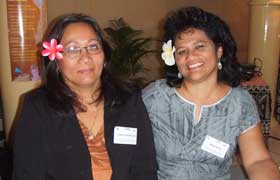WE’RE IN
Pacific Women in Media plan gets Cooks input

At the Women in Media symposium...
Samoa’s Faiesa Lei Sam Matafeo and and
American Samoa’s Monica Miller
MEDIA REPRESENTATIVES from around the region have called for gender-sensitive reporting standards, work ethics and equal employment opportunities to be priority in their industry.
This was the joint resolve of senior media managers and journalists who gathered at the Pacific Women in the Media Action Plan Symposium in Nadi, Fiji.
Pitt Media Group director Shona Pitt, who has headed broadcast organisations in both Cook Islands and Niue, represented Cook Islands.
During the keynote address which opened the symposium she was hailed as one of the region’s women in the media pioneers.
Laisa Taga, editor-in-chief of the Fiji-based regional news magazine Islands Business, gave the keynote address.
Taga said Shona Pitt was a director and one of the owners of “that impressive Cook Islands news media company the Pitt Media Group, which operates radio and TV stations and newspapers.
“Shona herself has been a pioneer in broadcasting,” Taga added.
”She is probably the only Pacific Islands woman to have headed news organisations in two countries - first as head of Cook Islands Television and then as general manager of the Broadcasting Corporation of Niue, operating Niue TV and Radio Sunshine.”
The Nadi symposium was organised and funded by the United Nations Educational Scientific and Cultural Organisation (UNESCO) Office for the Pacific, the Pacific Women’s Bureau of the Secretariat of the Pacific Community (SPC) and the Commonwealth Broadcasting Association.
Here’s the plan, as drawn up and endorsed by the participants in Nadi:
Part one: preamble
Participants at the UNESCO/SPC/CBA Pacific Women in the Media Action Plan Symposium, September 21-22, 2006, recognise that inequalities exist between men and women in the Pacific.
We commend current and ongoing efforts to address gender inequalities and further recognise that the media plays a powerful and influential role in shaping people’s attitudes and beliefs.
We, the participants at the Pacific Women in Media Action Plan Symposium, endorse the following action plan that promotes gender equality for individual media organisations in the region.
Part two: Content
We call on media organisations to:
· Value and promote awareness of women’s achievements and contributions to society
· Ensure fair, balanced and quality representation in all aspects of the media
· Ensure that equal treatment is given to all sources of information
· Resist rather than reinforce negative stereotyping along the lines of gender, race, religion, ethnicity, language, sexuality, age and class
· Take care not to use material that condones or incites any form of violence
· Make a commitment to promote human rights education and raise public awareness of any human rights violations
· Monitor government and other institutions on their progress towards implementing the Convention on the Elimination of All Forms of Discrimination Against Women (CEDAW), the Pacific Platform for Action (PPA) and the Millennium Development Goals (MDGs)
· Seek partnerships and information exchange with women’s civil society, including women’s media initiatives as appropriate
Part three - Promotion of gender equality in media organisations
We call on media organisations to:
· Promote gender sensitivity and the use of gender-inclusive language
· Ensure that media policies, including codes of ethics, are consistent with gender equality commitments
· Expose all staff to all aspects of media work, including technical and IT-based production as part of career development
· Prohibit sexual harassment in the work environment, and discipline offenders in a timely manner, ensuring perpetrators are reported for prosecution
· We also call on the Pacific Islands News Association (PINA) to develop a gender equality policy for adoption at the next PINA convention, and assist members in implementation
Strategies
1. Be open to external, independent and formal gender audits of media content while undertaking self-regulatory practices
2. Conduct training in the use of gender inclusive language and content ; develop style manuals
3. Put in place mentoring programmes for staff
4. Where there is no law addressing sexual harassment, work to promote the need for such legislation and monitor enforcement
5. Make a commitment to consistently highlight gender inequality and raise public awareness of human rights
6. Strengthen partnerships, support and information networks as appropriate, in particular between French and English-speaking media organisations, with assistance from UNESCO, SPC and CBA
7. Secure national and regional training opportunities that will enhance media practitioners’ knowledge of women’s issues and gender equality
8. Increase and improve media content which enables all members of society to contribute to public debate and discussion on ‘taboo’ issues such as violence, women’s vulnerability to HIV/AIDS, etc

Headlines : Times 170
- Business as usual
- Its not over yet!
- Mama Ngai: It’s the village first
-Marurai people’s choice, says Dr Maoate,but....
- TANGI: MY WAY
- The trouble with Tangaroa
- ‘Surviving’ here would be easy
- WE’RE IN : Pacific Women in Media plan gets Cooks input
Headlines : Times 169
- JOB CHANGE HITS DEMOS
- Where election will be decided
- VIEWS: "Integrity: Is it important?"
- Letter to the Editor: Our genealogy through Rangi Makeakea
- Taio sails in to help
- William Kauvai stands up to a big man in his vaka
- Rhino Beetle battle ‘won’
- Cooks teen ‘froze’ as baby drowned